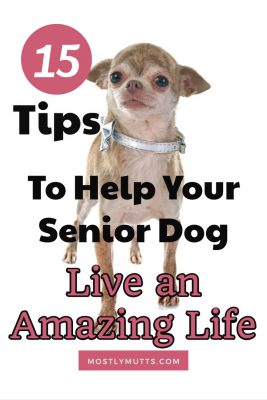The beautiful, bright-eyed, over-active puppy you brought home about seven years ago, is now entering a new phase of his life. Welcome to the senior dog years!
Signs of Aging in Senior Dogs
Table of Contents
Just like humans, senior dogs will begin to display signs of aging. Along with the graying muzzles, his mental and physical health will begin to change.
Aging Dogs Arthritis and Joint Problems
You may notice your senior dog begins to walk slower and tire easier. He may become snappy and not want to be touched. He probably long ago learned not to jump up on people but now he may also have trouble jumping up onto the porch, into the car or onto the bed. And stairs may be slow or impossible to climb. Old bones and tired muscles are now in control. Consider putting carpet or treads on your steps. Ramps are available for porches, decks, cars and beds. And nutritional supplements can help to ease the arthritis achiness he is feeling. Your Vet may also prescribe an arthritis medication. A supplement that is working well for our fifteen-year-old senior dog is Glucosamine Chondroitin. Short frequent walks with your senior dog help to keep his joints limber. Your Vet may also prescribe an arthritis medication.
- Consider putting carpet or treads on your steps.
- Ramps are available for porches, decks, cars, and beds.
- Nutritional supplements can help to ease the arthritis achiness he is feeling. Your Vet may also prescribe an arthritis medication. A supplement that is working well for our fifteen-year-old senior dog is Glucosamine Chondroitin. We use and like the Naturvet Brand.
- Short frequent walks with your senior dog help to keep his joints limber.
- Get an Orthopedic Bed to cushion and support your older dog’s joints.
Incontinence and Your Aging Dog
Older dogs go through changes just as they did in their puppy years. You may notice your senior dog urinating in the house. Remember when you patiently (for the most part) cleaned up his potty accidents, taught him not to jump on visitors and walk beside you (not several blocks ahead) on a leash? Well, now there may again be potty accidents due to forgetfulness or the fact that his bladder and bowels cannot hold it so well any longer. More frequent bathroom breaks may be in order. Remember, your senior dog does not want to disappoint you. He just is not able to wait.
- If you have a job outside the home, try to arrange for someone to come in during the day to let your dog out for a bathroom break. Hiring a dog walker may be an option.
- You can revert to the puppy days and use pee pads in your dog’s area when you are not home. Puppy pads can also be used in your dog’s bed if he is peeing while lying down.
- Another option for dog’s that wet their bed; Replace the bed with a crib or bassinette mattress, depending on your dog’s size. Cover with sheets to fit and then you can simply remove the wet sheet, wipe down the plastic surface of the mattress and replace it with a clean sheet. Often these sheets can be found at yard sales.
Age Related Health Issues to Watch for in Your Older Dog:
*Sudden lethargic behavior in a senior dog
*Cloudy eyes in your aging dog
*Older dog not seeming to hear you when called
*Slowness in movement or limping
*Confusion
*Senior dog losing weight
*Senior dog urinating in the house
While many of these changes are a normal part of aging if the symptoms appear suddenly or are very pronounced, schedule an appointment with your veterinarian. It could be a sign of a serious ailment that needs medical treatment.
15 Tips to Help Your Senior Dog Enjoy a Healthy, Happy Retirement:
- Exercise your senior dog with short, frequent walks and gentle, stimulating play. Don’t over do and be aware of the temperature when walking. Choose to take your walks in the early morning or later evening times. Take a small container and bottle of water with you and offer frequent sips to your dog. For convenience, I recommend a portable water/feeder to carry with you on your dog’s walk. This one has over 13,000 great reviews on Amazon.
- Change to a good quality senior formula dog food.
- Avoid giving too many treats or overfeeding to help prevent extra weight on his old bones. Green beans are a good substitute for more fattening treats and are easy for your aging dog to chew.
- Consider helpful aids like dog ramps, quality padded and heated beds, add nutritional supplements to his diet.
- Hopefully, you have already established a relationship with a good veterinarian that knows your dog. Now is the time to step up the visits to at least twice a year so your vet. can give your senior dog a physical assessment, checking for lumps and any other warning signs that may signal a need for further tests or treatment. Be sure to include dental care in your dog’s Vet visit.
- Keep your senior dog groomed, bathed, nails clipped and ears cleaned to help him feel refreshed. He may not think he likes a bath but, just like us, he will feel so much better when freshly bathed and groomed. And don’t forget to tell him, in your best praising tone, how good he smells and looks.
- Consider seeking out a dog massage therapist or learning to do dog massage yourself. Does wonders for achy joints and dogs love to be
touched.
- Provide your aging dog with good dental care. Poor care of your dog’s teeth and gums will cause him discomfort and may lead to heart and kidney disease. Brush his teeth at least a couple of times a week with a toothbrush specially made for dogs. If you need help with how to brush your dog’s teeth, take a look at this article. You can also supply your senior dog with a dog teeth cleaning chew toy that helps clean his teeth and massages the gums. And, he will not even suspect it is good for him. Get your dog a professional teeth cleaning at his veterinarian if his mouth has been neglected and he has tarter and plaque buildup.
- An elevated food and water bowl will be helpful if your aging dog has difficulty bending down to eat and drink.
- If your senior dog has trouble walking or getting up, try a sling lift harness specially made to help him. We used one for our senior Lab mix and it was a true blessing. It helped us to get her outside to potty as well as gave her a small bit of exercise.
- Older dogs tend to have less of an appetite and may lose some weight. f your senior dog does not want to eat, try adding bits of cheese, some meat baby food or canned sardines to his food. This often will help stimulate his appetite and help prevent weight loss.
- As the weather gets chillier, make sure your elderly dog is staying warm. Provide him with a warm sweater or tuck a blanket around him as he sleeps.
- Keep your aged dog bathed and groomed. We all feel better after a nice bath or shower and your older dog is no exception.
- Spend time taking your older dog out for special treats. Chances are he will still enjoy a trip to Starbucks for a Puppichino or to McDonalds for a plain cheeseburger. Take him to the park, simply to enjoy being outside and watching the world go by.
- Above all, shower your senior dog with lots and lots of hugs, praise and affection. Dogs, as well as humans, live happy healthier lives when they are shown love and acceptance.
Your senior dog may not be the bouncy active dog he once was but inside still dwells the puppy you once knew. But, in his golden years he still desires many of the things he has always enjoyed. By giving him these things, as his health permits, it will help him to live a happier healthier life and you will know you have given him the best throughout all the years of his life.
This post contains some affiliate links for your convenience (which means if you make a purchase after clicking a link I will earn a small commission but it won't cost you a penny more) Click here for my full disclosure policy.




Leave a Reply